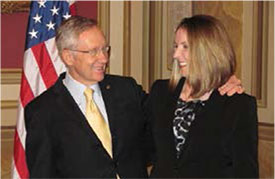
Lindsay Rhodes, MD, greets her former employer U.S. Sen. Harry Reid, D-Nev., during Congressional Advocacy Day. Dr. Rhodes worked in Sen. Reid’s office prior to attending medical school.
Congratulations on beginning your career in ophthalmology! Think about the many steps you took to arrive at this point. You studied through college, completing the necessary premedical requirements and the formidable MCAT. You wrote countless essays about why you wanted to become a physician. After being accepted to medical school, you spent four challenging years learning the art and science of practicing medicine. Each of those years was filled with innumerable hours studying, frequent exams, physical and emotional challenges on the wards and excelling on the numerous USMLE Step exams. Towards the end of medical school, again, you wrote essays and spent a significant amount of time, money and energy applying to and interviewing for ophthalmology residency. Finally, you just completed a long intern year!
Over the next five years of your career, you will continue to take steps towards your goal, diligently studying a field mostly unknown to you now. You will take yearly OKAP exams and possibly complete a fellowship. You will spend a large amount of money and significant stress on both the written and oral exams to become a board-certified ophthalmologist. And at the end of this rigorous journey spanning over a decade, you will have earned the privilege to protect eyesight.

Lindsay Rhodes, MD (center) with Alabama Academy of Ophthalmology Advocacy Ambassadors Michael Neimkin, MD (left) and Mark Hill, MD (right).
But then you must take another step: step into the role of leader of the eye care team, protecting your patients’ sight in the clinic, in the operating room AND in the public domain. While the majority of residency will be spent learning the skills to care for patients clinically and surgically, it is equally as important to learn about advocating for patients in the public domain. One of the most exciting ways to learn about advocacy is to participate in the American Academy of Ophthalmology’s Advocacy Ambassador Program. Every April, the Academy holds the Mid-Year Forum in Washington, D.C. A component of that meeting, Congressional Advocacy Day, provides the opportunity to talk with Congress members about how to protect our patients’ vision. Through the Advocacy Ambassador Program, Ophthalmology residents and fellows are sponsored to attend by their state ophthalmology societies, subspecialty societies and training programs and the registration fee is waived by the Academy. Advocacy ambassadors meet their Congress members on the Hill alongside leaders in ophthalmology, and engage first-hand in being leaders protecting sight. Another important way to engage in advocacy is to be a member of your state ophthalmology society, so that you can stay informed about local issues affecting your patients.
Take that next step and learn to advocate for your patients. No one has worked as hard as you have to earn the privilege of protecting vision.
* * *
 About the author: Lindsay A. Rhodes, MD, is an assistant professor of ophthalmology at the University of Alabama at Birmingham School of Medicine. Dr. Rhodes is a member of the Academy’s YO advocacy subcommittee and the Leadership Development Program XVII, class of 2015.
About the author: Lindsay A. Rhodes, MD, is an assistant professor of ophthalmology at the University of Alabama at Birmingham School of Medicine. Dr. Rhodes is a member of the Academy’s YO advocacy subcommittee and the Leadership Development Program XVII, class of 2015.